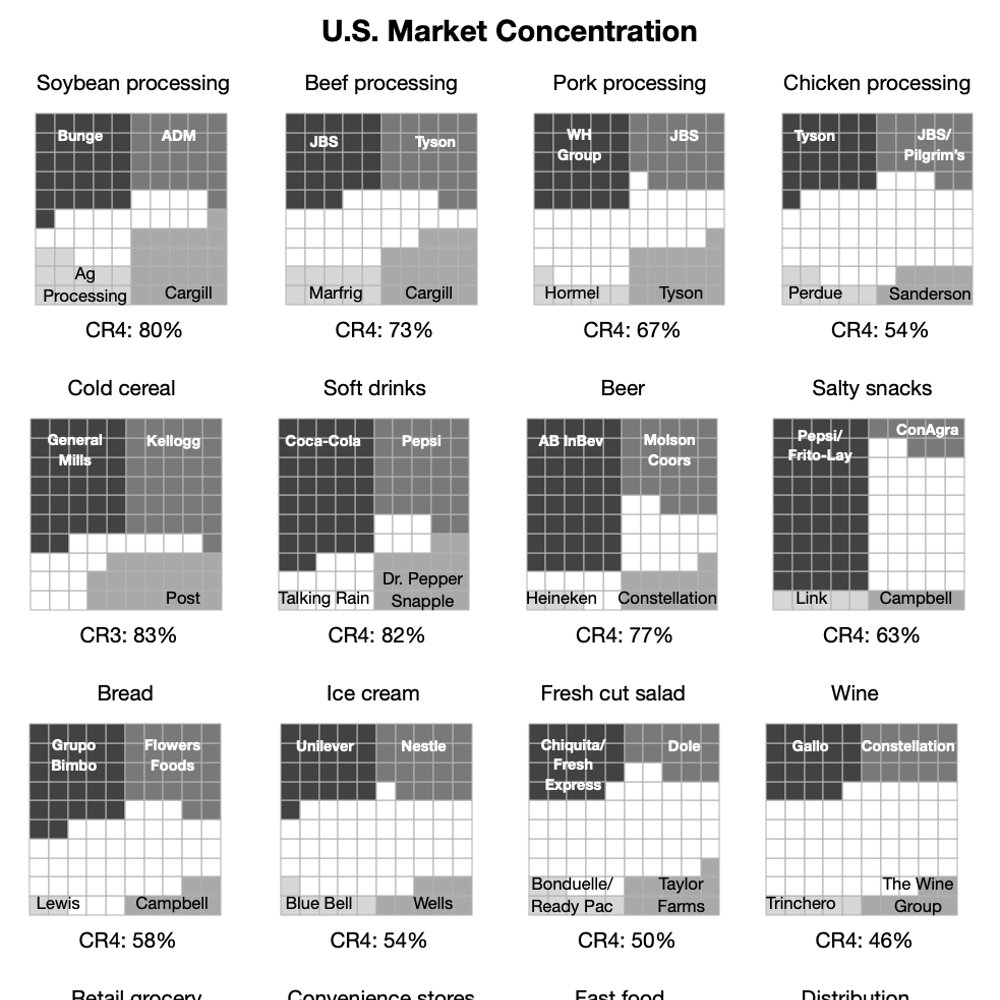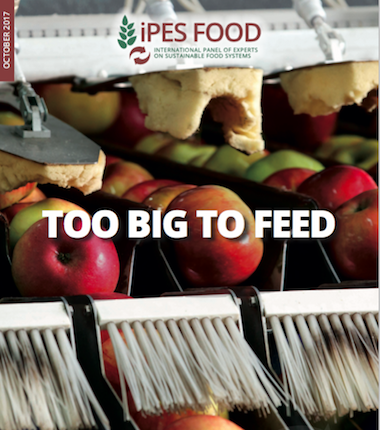 'Corporate concentration in the US #food system makes food more expensive and less accessible for many Americans'
'Corporate concentration in the US #food system makes food more expensive and less accessible for many Americans' 


 Excellent new piece in the @ConversationUS by @hendricksonm & IPES-Food's own Phil Howard
Excellent new piece in the @ConversationUS by @hendricksonm & IPES-Food's own Phil Howard 
Quick thread!
 /1 https://theconversation.com/corporate-concentration-in-the-us-food-system-makes-food-more-expensive-and-less-accessible-for-many-americans-151193
/1 https://theconversation.com/corporate-concentration-in-the-us-food-system-makes-food-more-expensive-and-less-accessible-for-many-americans-151193
"We’ve closely followed #corporate consolidation of food production, processing and distribution in the U.S. over the past 40 years. In our view, this process is making #food less available or affordable for many Americans," say Hendrickson & Howard. /2
"Consolidation has placed key decisions about our nation’s #foodsystem in the hands of a few large companies, giving them outsized influence to #lobby policymakers, direct food and industry #research and influence #media coverage." /3
"Industry consolidation is hard to track. Subsidiary firms often controlled by 1 parent corp. & engage in “contract packing,” where a single processing plant produces identical foods then sold under dozens of different brands – incl. labels that compete against each other." /4
"As #unemployment has risen during #pandemic, so has no. of hungry Americans. Feeding America estimates that up to 50 million people –incl. 17 million children– may currently be experiencing food insecurity. In  demand at food banks grew by over 48% during 1st half of 2020." /5
demand at food banks grew by over 48% during 1st half of 2020." /5
 demand at food banks grew by over 48% during 1st half of 2020." /5
demand at food banks grew by over 48% during 1st half of 2020." /5
"Disruptions in food supply chains forced #farmers to dump milk down the drain, leave produce rotting in fields & euthanize livestock that could not be processed. Estimate that March-May 2020, farmers disposed of somewhere between 300,000 and 800,000 hogs & 2 million chickens" /6
 "What role does concentration play in this situation? Research shows that #retail concentration correlates with higher #prices for consumers
"What role does concentration play in this situation? Research shows that #retail concentration correlates with higher #prices for consumers  It also shows that when #foodsystems have fewer production and processing sites, disruptions can have major impacts on supply." /7
It also shows that when #foodsystems have fewer production and processing sites, disruptions can have major impacts on supply." /7
"Consolidation makes it easier for industry to maintain high prices. With few players, companies simply match each other’s price increases rather than competing. Concentration in the US #food system has raised the costs of everything from breakfast #cereal & #coffee to #beer." /8
"As the pandemic roiled the  #foodsystem through 2020, consumer food costs rose by 3.4%, compared to 0.4% in 2018 & 0.9% in 2019. We expect retail prices to remain high because they are “sticky,” w/ tendency to increase rapidly but to decline more slowly & only partially." /9
#foodsystem through 2020, consumer food costs rose by 3.4%, compared to 0.4% in 2018 & 0.9% in 2019. We expect retail prices to remain high because they are “sticky,” w/ tendency to increase rapidly but to decline more slowly & only partially." /9
 #foodsystem through 2020, consumer food costs rose by 3.4%, compared to 0.4% in 2018 & 0.9% in 2019. We expect retail prices to remain high because they are “sticky,” w/ tendency to increase rapidly but to decline more slowly & only partially." /9
#foodsystem through 2020, consumer food costs rose by 3.4%, compared to 0.4% in 2018 & 0.9% in 2019. We expect retail prices to remain high because they are “sticky,” w/ tendency to increase rapidly but to decline more slowly & only partially." /9
For Prof. Howard & @hendricksonm, "A resilient food system that feeds everyone can be achieved only through a more equitable distribution of #power. This in turn requires action in areas ranging from contract law & #antitrust policy to workers’ rights & economic development." /10
 #DYK? IPES-Food & Prof. Howard have already produced a key report on what's needed for more #resilient food systems.
#DYK? IPES-Food & Prof. Howard have already produced a key report on what's needed for more #resilient food systems.  'Too big to feed: Exploring the impacts of mega-mergers, consolidation & concentration of power in the #agrifood sector'
'Too big to feed: Exploring the impacts of mega-mergers, consolidation & concentration of power in the #agrifood sector'  http://www.ipes-food.org/_img/upload/files/Concentration_FullReport.pdf /11
http://www.ipes-food.org/_img/upload/files/Concentration_FullReport.pdf /11
For Professors Hendrickson & Howard, "the goal should be to produce more locally sourced #food with shorter and less-centralized supply chains. #Detroit offers an example. Over the past 50 years, food producers there have established more than 1,900 #urbanfarms & #gardens." /12
"The  federal gov. can help by adapting #farm support programs to target farms & businesses that serve local & regional markets. State & federal incentives can build #community- or #cooperative-owned farms & processing & distribution businesses." = More resilient #foodsystem
federal gov. can help by adapting #farm support programs to target farms & businesses that serve local & regional markets. State & federal incentives can build #community- or #cooperative-owned farms & processing & distribution businesses." = More resilient #foodsystem
 federal gov. can help by adapting #farm support programs to target farms & businesses that serve local & regional markets. State & federal incentives can build #community- or #cooperative-owned farms & processing & distribution businesses." = More resilient #foodsystem
federal gov. can help by adapting #farm support programs to target farms & businesses that serve local & regional markets. State & federal incentives can build #community- or #cooperative-owned farms & processing & distribution businesses." = More resilient #foodsystem
@threadreaderapp unroll :)

 Read on Twitter
Read on Twitter



